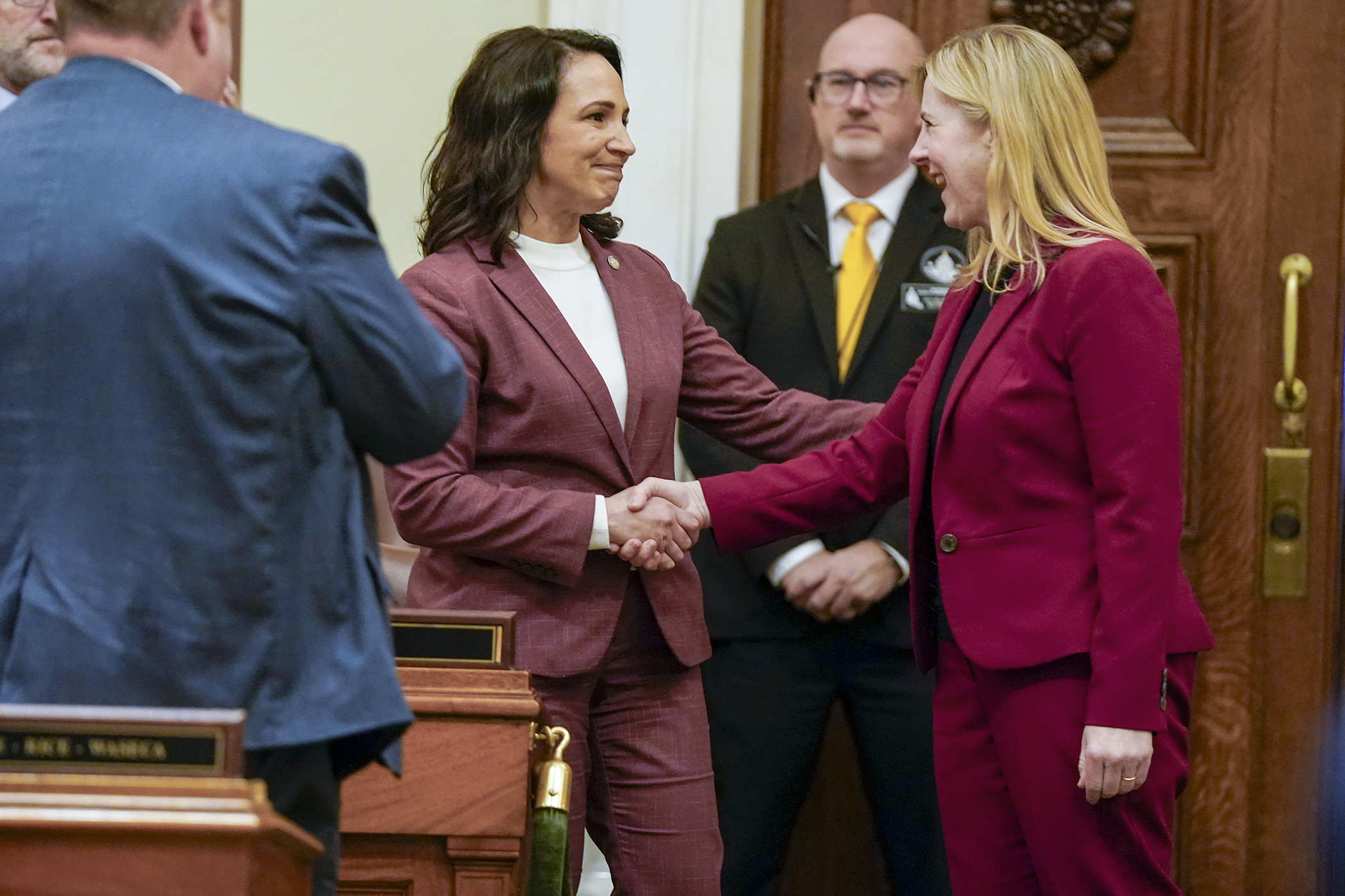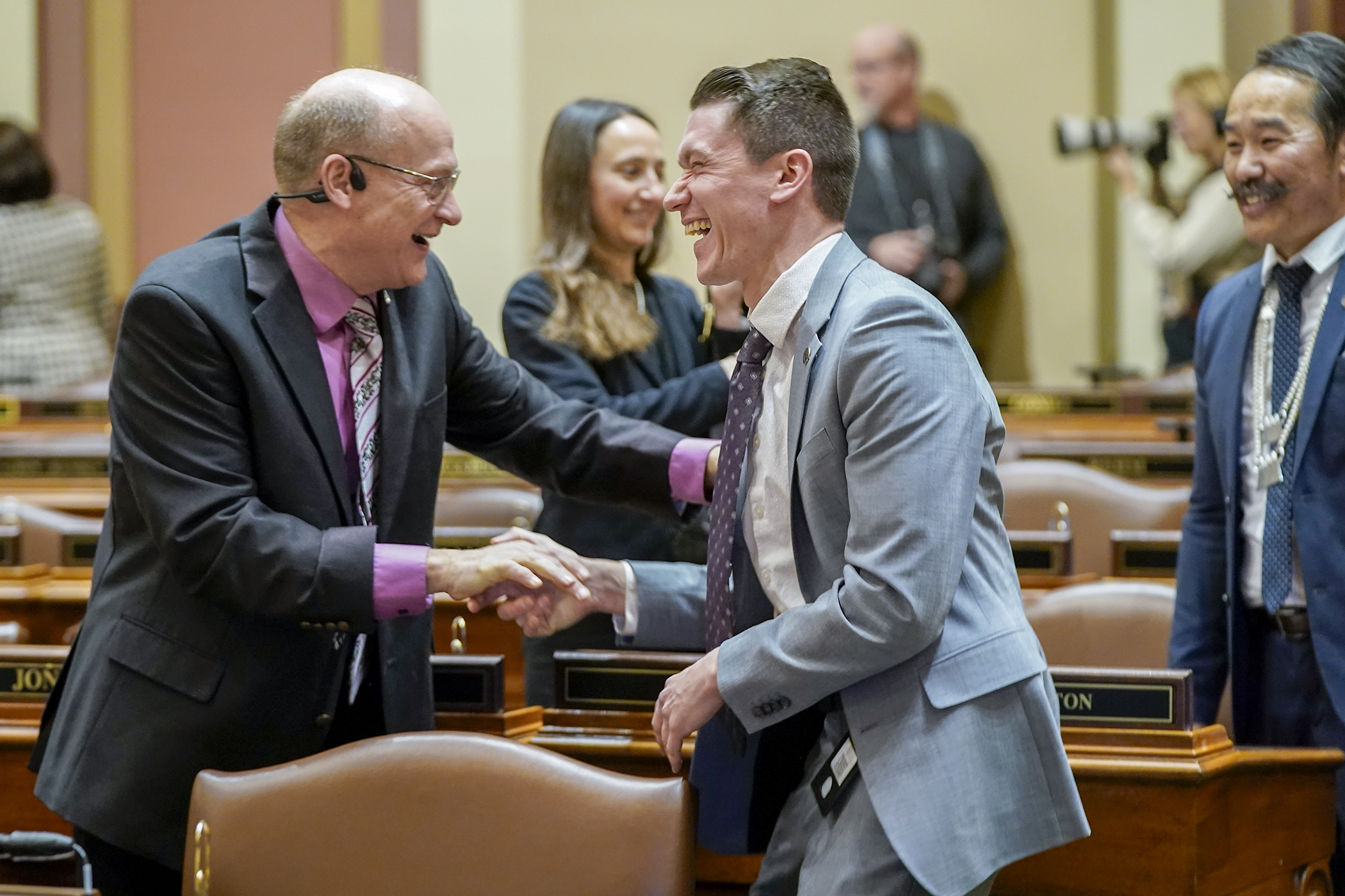Full House convenes for first time in 2025, elects Demuth speaker

With a quorum for the first time, the House officially began the 2025-26 session Thursday after a more than three-week DFL boycott.
A power-sharing agreement between Republican and DFL leaders Wednesday evening has spelled out how the two parties would operate for the next two years with or without a membership tie.
The session was largely ceremonial and organizational with Rep. Lisa Demuth (R-Cold Spring) elected speaker of the House for the biennium. The first female Republican and first Black person to hold the position, she prevailed over House DFL Leader Melissa Hortman (DFL-Brooklyn Park) by a 67-65 party-line vote.
“What an honor it is to stand before you and get ready to do the work that Minnesotans are counting on each one of us to do together,” Demuth said in remarks to the body.
Rep. Dave Baker (R-Willmar) said Demuth has the leadership skills that these difficult and divisive times call for.
“I believe true leadership must impose civility and trust. Wisdom and inclusiveness. Patience with grace. A leader must be tough, but fair,” he said.
Operating under a “new normal”
How will this House session look different from sessions past?
For at least the next month or so, it will bear a close resemblance to instances when one party has had a narrow majority. Republicans will hold the speakership and the gavels for all 26 House committees. All but one committee will have a one-vote Republican advantage.
 Rep. Jeff Backer, left and Rep. Matt Norris greet each other on the House floor Feb. 6. House DFLers returned to the House Chamber for the first time during the 2025 session after leaders struck a power-sharing agreement. (Photo by Michele Jokinen)
Rep. Jeff Backer, left and Rep. Matt Norris greet each other on the House floor Feb. 6. House DFLers returned to the House Chamber for the first time during the 2025 session after leaders struck a power-sharing agreement. (Photo by Michele Jokinen)The new House Fraud Prevention and State Agency Oversight Committee will continue to be chaired by a Republican and have a 5-3 Republican majority.
However, if the House returns to a 67-67 tie following a March 11 special election in House District 40B, new rules will come in to play. If that’s the case, then all committees except fraud prevention will be evenly divided by party and each will have a co-chair and a co-vice chair from each party. It would be up to co-chairs to determine rules on how to share power in their committees.
And no matter what happens in the District 40B special election, this fraud committee arrangement will remain through 2026.
Looking forward into the spring, House membership on conference committees will be evenly divided by party. In the past, House speakers appointed all conference committee members and decided how many came from each party.
If a Republican wins the March 11 special election, then the next two years will look a lot like they will next week when House committees assume a regular schedule.
Power-sharing agreement
The boycott-ending agreement, in the form of a resolution offered by House Majority Leader Harry Niska (R-Ramsey) was adopted 130-2.
Reaching this point required assurances from Republican leaders that they wouldn’t use their 67-66 advantage to not seat Rep. Brad Tabke (DFL-Shakopee).
Tabke won his District 54A seat by 14 votes, but 20 absentee ballots were likely thrown away by mistake. A district court judge ruled Jan. 14 that Tabke is the winner. While negotiations were ongoing, DFLers said Republicans did not publicly commit to seating him. Once an assurance to seat Tabke was in the agreement, Hortman was satisfied the DFL boycott could end.
-- Session Daily writer Rob Hubbard contributed to this story.
Related Articles
Search Session Daily
Advanced Search OptionsPriority Dailies
Speaker Emerita Melissa Hortman, husband killed in attack
By HPIS Staff House Speaker Emerita Melissa Hortman (DFL-Brooklyn Park) and her husband, Mark, were fatally shot in their home early Saturday morning.
Gov. Tim Walz announced the news dur...
House Speaker Emerita Melissa Hortman (DFL-Brooklyn Park) and her husband, Mark, were fatally shot in their home early Saturday morning.
Gov. Tim Walz announced the news dur...
Lawmakers deliver budget bills to governor's desk in one-day special session
By Mike Cook About that talk of needing all 21 hours left in a legislative day to complete a special session?
House members were more than up to the challenge Monday. Beginning at 10 a.m...
About that talk of needing all 21 hours left in a legislative day to complete a special session?
House members were more than up to the challenge Monday. Beginning at 10 a.m...